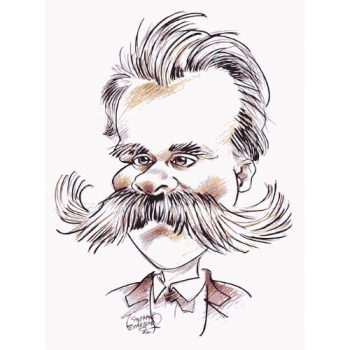“Not knowing how to listen, neither can they speak.” (Kahn 17; cp. DM & S 19)
We listen before we speak, quite literally. We learn to speak only out of the social context of a language community. Humans learn languages, but the specific language(s) we learn depend on the specific cultures(s) in which we are raised. It depends on the language that our parents or communities speak to us.
But our subjective experience and ability to speak is dependent not only on the specific tools acquired through our language communities, but also on the theoretical content acquired through our knowledge communities. Through social interaction with those who know things, we come to our own ideas. We are only then able to say something substantive.
It is not at all clear that Heraclitus had any thoughts like those above in mind. But they are a way to extend what he says in a direction that makes some sense. I want to follow those thoughts just a bit further into the history of philosophy before returning to another idea related to above–namely, I want to follow them to Descartes. Descartes was important for helping to facilitate rational and clear thinking, as much as possible freed from the prejudices of the past. Yet his famous methodological doubt has of course something artificial about it that the above reflections help draw attention to. Had he literally doubted everything, he would have needed to remain silent. The very words he reflected with would have failed him. Not only that but the arguments that he provides as “clear and distinct” ideas to rebuild a rationally founded worldview were arguments that others before him had made, at least in general outline. Augustine had famously said, “If I am mistaken, I am,” preempting Descartes’ later argument that “I think therefore I am.” Anselm had famously already developed an ontological argument like that offered by Descartes.
Of course, Descartes placed these ideas in a new system and added to them in relevant ways. We do reflect on ideas we have inherited. We can add to those ideas and contribute to the growth of knowledge or creatively re-express ideas. But listening is important as a first step to give us a foundation on which to build. For any theoretical undertaking, if we have not understood the basic issues at stake, then our comments to address a theoretical issue will likely not say anything important to anyone.
At another basic level, only very indirectly related to theory formation of importance to the history of ideas, we can take another look at the quote from Heraclitus. In fact, Heraclitus’ aphorism draws attention to the fact that conversation of any sort is public. If we didn’t listen to those who we are conversing with but just uttered some words, our conversations would be a series of non sequiturs. We might utter words, but they would have no meaning to those with whom we were speaking. In fact, those with whom we converse have minds, share logic and reasoning abilities. To say anything that matters in a conversation, we have to listen to others and address concerns they have raised. In such contexts, without listening, we really cannot say anything meaningful. We have all had conversations with people like those Heraclitus mentions in the aphorism. Sometimes in fact they go on and on. Yet in fact they say nothing.
